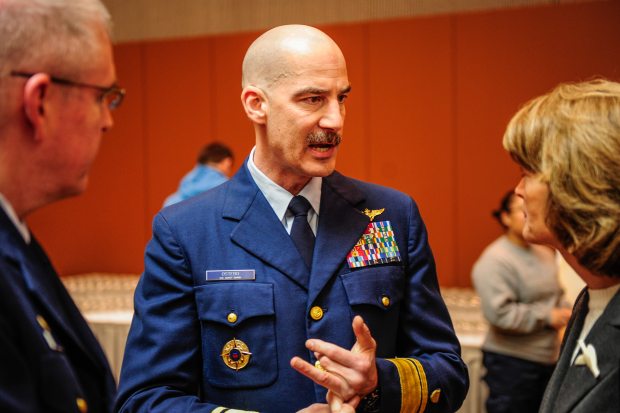U.S. Coast Guard lays out its Arctic vision for the next decade

Earlier this week, the U.S. Coast Guard revealed its Arctic Strategy, a document that describes how the agency intends to contribute to the National Strategy for the Arctic Region signed by President Barack Obama earlier this month.
Soon after the Coast Guard released its plan, U.S. Sen. Mark Begich, D-Alaska, announced his own contribution to the emerging needs of national defense at the top of the world in the Last Frontier: hand-me-down airplanes.
In a letter to the U.S. Department of Homeland Security, Begich asked Secretary Janet Napolitano to transfer what he termed “underutilized U.S. Air Force cargo aircraft” to the Coast Guard. Repurposed with a new life at a different agency, the C-27J aircraft could save the Coast Guard $800 million, enough to buy a new icebreaker, Begich reasoned.
The creative thinking comes at a time when the Obama administration has been clear about the need to manage Arctic preparedness by coordinating resources among public and private entities, at all levels of government and non-government stakeholders, and foster international relationships.
Vice President Joe Biden, speaking to a graduating class of Coast Guard cadets, underscored the need for adaptability this week when he told them the changing Arctic is exposing new “fault lines” among nations, and that the newly minted officers will need to be prepared to enter and defend a world that didn’t exist when they were born — one with the prospect for ice-free passages across the Arctic.
The general thinking is that more open water will bring more commerce, more oil and gas exploration, more tourism, more sea-faring traffic. Yet high in the nation’s Arctic, there are no deepwater ports and there is no permanent Coast Guard infrastructure. The Coast Guard doesn’t foresee that changing soon.
The 10-year Arctic strategy calls for a persistent, capable U.S. Coast Guard presence in the Arctic, but one that relies on what has been termed “mobile offshore” infrastructure with a seasonal presence.
“The Arctic region is the emerging maritime frontier, vital to our national interests, economy and security,” Admiral Robert J. Papp, Jr., Commandant of the U.S. Coast Guard, said when unveiling the strategy Tuesday during a talk at the Center for Strategic and International Studies.
“We protect those on the sea. We protect America from threats delivered by sea. And we protect the sea itself,” he explained.
Through the use of cutters, icebreakers and aircraft, the Coast Guard will aim to serve the more than 1,000 miles of Alaska coastline in the nation’s Arctic, and the more than 200,000 square miles of water in the Beaufort and Chukchi Seas that are part of its jurisdiction.
The Coast Guard’s Arctic strategy calls for the design and construction of a new, heavy-duty ice breaker for its fleet, an asset that could cost more than $1 billion, if costs run high.
Like Obama’s National Strategy for the Arctic, the Coast Guard is also calling for a “whole government” and “whole nation” approach in order for the U.S. to be fully ramped up for increased human activity in the Arctic. Only through collaboration with all levels of government, shared scientific knowledge, tribal input, and relationships with non-governmental organizations, industry and academia, will a better overall picture of the Arctic — including its sensitivities and needs — emerge.
The Coast Guard’s Arctic policy has three main goals: improve awareness, modernize governance and broaden partnerships.
“For almost 223 years, we have overseen the safety, security, and stewardship of our nation’s waters. Our challenge today is to ensure we are prepared with a Coast Guard capable and ready to meet our responsibilities in the Arctic. We need to react. It’s time to adapt,” Papp said Tuesday.
Contact Jill Burke at jill(at)alaskadispatch.com



